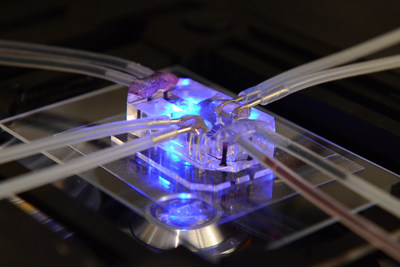Wyss Institute's Human Organs-on-Chips Honored As Best Product Design By London's Design Museum
BOSTON, May 15, 2015 /PRNewswire-USNewswire/ -- The Wyss Institute's human organs-on-chips, represented by the human lung, gut and liver chips, have won the 2015 Designs of the Year Awards prize in the best Product design category. The annual awards and museum exhibition by the Design Museum in London recognizes the most innovative, high-impact, and forward-thinking designs from across the world.

"This year's judges were united in their responsibility to award projects that emphasize design's impact on our lives now and in the future. Solving diverse problems with innovation, intelligence and wit, each of these six designs is a worthy winner," said Gemma Curtin, Curator of Designs of the Year, speaking about the six prize winners representing Product, Architecture, Fashion, Transport, Digital and Graphics design.
Currently in its eighth year, the 2015 Designs of the Year Awards & Exhibition features 76 total nominees across six categories, chosen by the world's top design experts, practitioners, curators and academics. This year's awards will climax next month, in June, when an overall Design of the Year prize will be bestowed upon one of the six selected finalists.
To clinch the Product prize, the Wyss' human organs-on-chips competed against 22 other product designs, including: QardioArm, a discreet personal heart monitor; Project Daniel, a lab that braves hostile war conditions to 3D-print prosthetic arms for children in Sudan; Dragonfly, an asymmetric chair inspired by insects; a DIY gamer kit, which can be a technology learning aid for children; CurrentTable, a table that photosynthesizes electricity; and an air-purifying billboard that turns pollution into clean air.
"As a scientist whose work has been influenced and inspired by art and design from the very beginning of my career, I am greatly honored that organs-on-chips have won this year's Product prize for design," said Wyss Institute Founding Director Donald E. Ingber, M.D., Ph.D., who invented human organs-on-chips alongside Dan Dongeun Huh, Ph.D., who was a Wyss Technology Development Fellow at the time of its invention. "We are thrilled to know that an international forum of experts who are passionate about the power of design appreciate both the elegance and potential impact of our living organs-on-chips microdevices."
The initial human organ-on-a-chip, designed at the Wyss Institute in 2010 by Ingber and Huh, has since been leveraged for the design of several additional human organs-on-chips. These microdevices have the potential ability to deliver transformative change to human health and pharmaceutical care due to the accuracy with which they emulate human organ-level functions. They stand to significantly reduce the need for animal testing by providing a faster, less expensive, less controversial and much more accurate means to predict whether new drug compounds will be successful in human clinical trials. In 2014, the startup company Emulate, Inc., sprang out of the Wyss Institute in order to commercialize human organs-on-chips.
"With drug development costs running into billions of pounds, this entry really caught the imagination of all the judges. It's an intriguing and exciting prospect that has the potential to reduce animal testing, and at the same time speed up development of new drugs," said member of the award jury Richard Woolley, who is Studio Director at Land Rover Design Research & Special Vehicle Operations.
Human organs-on-chips are built using an innovative microfabrication process adapted from the computer chip industry, in which multi-layer photolithography is used to manufacture memory-stick-sized blocks of crystal-clear, flexible rubber that contain hollow microchannels. These microchannels are then lined with living organ cells and blood capillary cells under fluid flow and manipulated mechanically using vacuum-powered movements to replicate organ movements.
The human organs-on-chips and 75 other overall nominees are currently on display in the Designs of the Year Awards Exhibition at the Design Museum in London, which will remain open until August 2015.
Previous overall winners of the Design of the Year awards have been:
2014: Heydar Aliyev Center by Zaha Hadid Architects
2013: GOV.UK UK Government website by GDS
2012: London 2012 Olympic Torch by Edward Barber and Jay Osgerby
2011: Plumen 001 by Samuel Wilkinson and Hulger
2010: Folding Plug by Min-Kyu Choi
2009: Barack Obama Poster by Shepard Fairey
2008: One Laptop Per Child by Yves Béhar
PRESS CONTACT:
Wyss Institute for Biologically Inspired Engineering at Harvard University
Kat J. McAlpine, katherine.mcalpine@wyss.harvard.edu, +1-617-432-8266
The Wyss Institute for Biologically Inspired Engineering at Harvard University (http://wyss.harvard.edu) uses Nature's design principles to develop bioinspired materials and devices that will transform medicine and create a more sustainable world. Wyss researchers are developing innovative new engineering solutions for healthcare, energy, architecture, robotics, and manufacturing that are translated into commercial products and therapies through collaborations with clinical investigators, corporate alliances, and formation of new start-ups. The Wyss Institute creates transformative technological breakthroughs by engaging in high risk research, and crosses disciplinary and institutional barriers, working as an alliance that includes Harvard's Schools of Medicine, Engineering, Arts & Sciences and Design, and in partnership with Beth Israel Deaconess Medical Center, Brigham and Women's Hospital, Boston Children's Hospital, DanaFarber Cancer Institute, Massachusetts General Hospital, the University of Massachusetts Medical School, Spaulding Rehabilitation Hospital, Boston University, Tufts University, and Charité - Universitätsmedizin Berlin, University of Zurich and Massachusetts Institute of Technology.
Photo - http://photos.prnewswire.com/prnh/20150515/216317
To view the original version on PR Newswire, visit:http://www.prnewswire.com/news-releases/wyss-institutes-human-organs-on-chips-honored-as-best-product-design-by-londons-design-museum-300084324.html
SOURCE Wyss Institute for Biologically Inspired Engineering at Harvard University
 Help employers find you! Check out all the jobs and post your resume.
Help employers find you! Check out all the jobs and post your resume.
